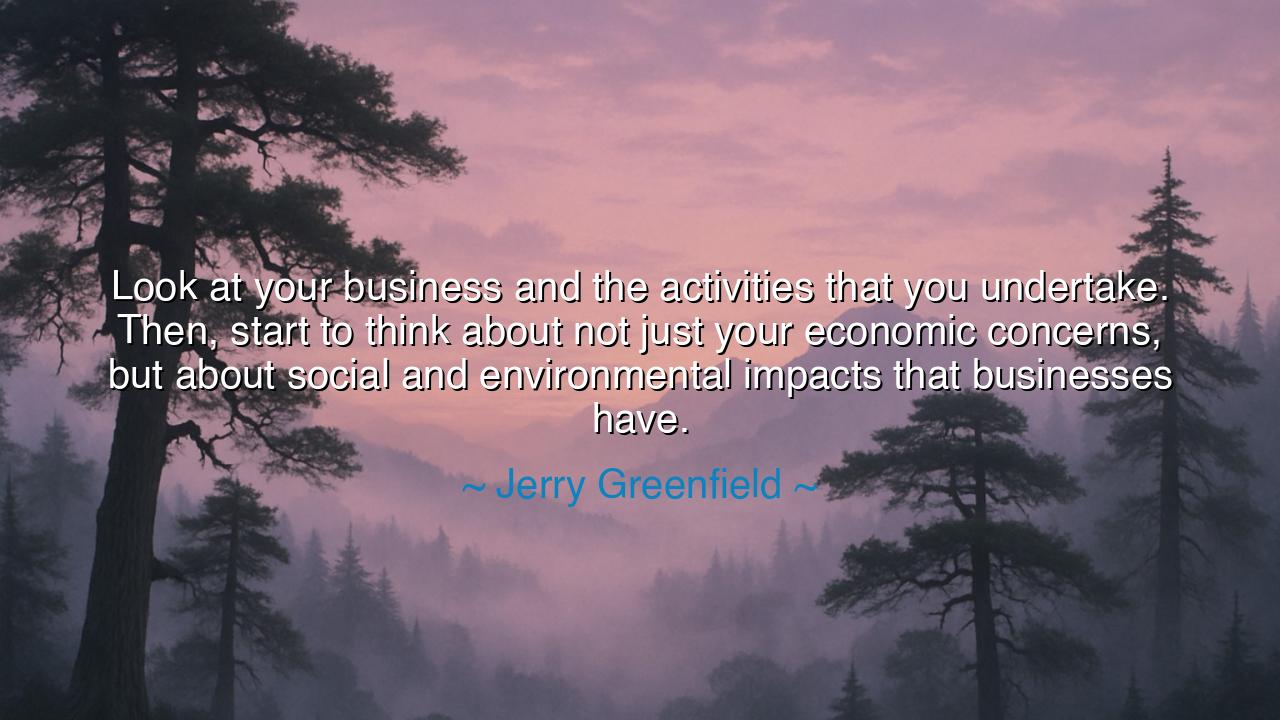
Look at your business and the activities that you undertake.
Look at your business and the activities that you undertake. Then, start to think about not just your economic concerns, but about social and environmental impacts that businesses have.






Hear the voice of Jerry Greenfield, co-founder of a humble ice cream venture that became a beacon of conscience, who declared: “Look at your business and the activities that you undertake. Then, start to think about not just your economic concerns, but about social and environmental impacts that businesses have.” This is no idle suggestion, but a summons to higher stewardship. For in this age, where wealth and industry span continents, the choices of one company may ripple across oceans, forests, and the lives of countless souls. To think only of profit is to see with one eye; to consider also the social and environmental impacts is to see with full vision, and to walk in wisdom.
In ancient times, the measure of a ruler was not only in his treasury, but in the welfare of his people and the fertility of his land. A king who amassed gold while his subjects starved was remembered not as mighty, but as cruel. Likewise, a company that fattens its ledgers while poisoning rivers and exploiting workers may appear triumphant for a season, but history will record it as a destroyer. Greenfield, having built Ben & Jerry’s upon values of fairness and sustainability, speaks as one who knows: that a business is not merely an engine of wealth, but a living part of the community and the earth.
Consider the tale of the Cadbury chocolate company in England. At the turn of the twentieth century, while many factories subjected laborers to squalor, the Cadbury family built Bournville, a village of clean housing, gardens, and schools for their workers. They sought not only profit, but the dignity of human lives. Their business endured, not merely for its sweets, but for the sweetness of its principles. Here lies Greenfield’s truth made manifest: when businesses consider the social impact of their actions, they build legacies that outlast markets.
So too in our own day, we see examples of companies that heed or ignore this wisdom. Some corporations plunder the earth, strip forests bare, and leave toxic scars upon the land. They may boast of quarterly profits, yet their gains are bought with the hunger of future generations. Others, however, choose another path. They invest in renewable energy, they ensure their workers are treated with fairness, and they use their influence to protect the vulnerable. These are the businesses that embody Greenfield’s call, proving that commerce and conscience need not be enemies, but allies.
The heart of Greenfield’s teaching is responsibility. Every business activity, whether grand or small, shapes the world beyond the ledger. To ignore this truth is to walk in blindness. A factory may give jobs, but if it poisons a river, the community pays the greater cost. A company may deliver cheap goods, but if it exploits labor in distant lands, the unseen suffering stains its hands. Yet a business that honors people and planet as well as profit becomes a pillar of stability, a beacon of integrity, and a blessing to generations.
The lesson is clear for all: whether you lead a vast corporation or a humble trade, consider the full circle of your deeds. Ask not only, “What will I gain?” but also, “Whom will I harm or help? What land, what water, what lives are touched by my hand?” For in answering rightly, you weave a pattern of justice and harmony; in answering wrongly, you set in motion decay and resentment.
Practical action lies within reach of all. Choose suppliers who respect the earth. Treat workers with fairness and dignity. Reduce waste, conserve energy, and give back to the communities that sustain you. As a consumer, support businesses that embody these values, and hold accountable those who do not. For every coin spent is a seed sown, and the harvest will shape the world your children inherit.
Thus remember the teaching of Jerry Greenfield: a business is not an island. It is a river that flows into the wider sea of society and the earth. Let that river carry not poison, but life. Let your enterprise be remembered not only for what it earned, but for what it preserved, protected, and gave. For in the end, true wealth is not in profit alone, but in the flourishing of people and planet together.






AAdministratorAdministrator
Welcome, honored guests. Please leave a comment, we will respond soon